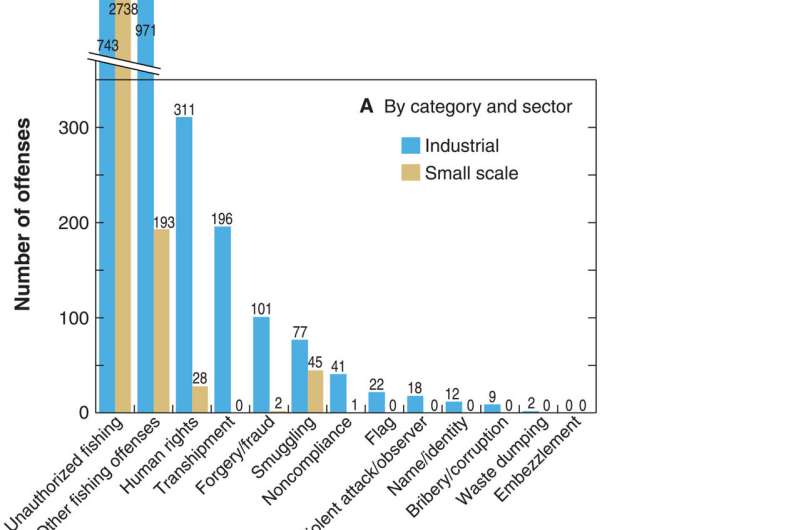March 25, 2022 report
Assessing the links between observed fishery-related offenses across the world's oceans

A pair of researchers, one with Canada's Nautical Crime Investigation Services, the other with the University of British Columbia, has conducted an assessment of fishery-related criminal offenses on the world's oceans. In their paper published in the journal Science Advances, Dyhia Belhabib and Philippe Le Billon describe their methods and suggest ways to reduce such activities.
Prior research has suggested that criminal activity by people aboard ships around the world is contributing to overfishing in many parts of the world's oceans. But because of the remote locations involved, much of the criminal activity that goes on is not recorded. In this new effort, the researchers attempted to get a better picture of such criminal activity by analyzing available data.
The work involved obtaining access to government reports from around the globe and data from various non-governmental organizations and media reports. They entered all results into a database they called the Criminal Record of Fishing Vessels and then performed a host of different queries on the database hoping to find patterns or linkages.
In looking at the results, they found that approximately a quarter of the value of all seafood products come from illegal fishing activities. And nearly half of the crimes in their database were related to unauthorized fishing. They suggest such activity leads to overfishing and reduced stock in parts of the world's oceans. They also note that they found offenses that were not directly related to fishing, such as transport of contraband and human rights abuses, such as slavery at sea.
The research pair note that they were able to identify the owner of the vessel involved in an offense in 1,700 of the reported instances and that approximately a third of the offenses were committed by personnel aboard just 450 vessels, which represented just 20 countries.
The researchers suggest that there are ways to reduce the number of offenses committed on the high seas, most of which involve pressuring governmental authorities to crack down on corrupt fishing entities under their jurisdiction. They also note that authorities need to address the full range of crimes that are being conducted in their territorial waters.
More information: Dyhia Belhabib et al, Fish crimes in the global oceans, Science Advances (2022). DOI: 10.1126/sciadv.abj1927
Journal information: Science Advances
© 2022 Science X Network




















